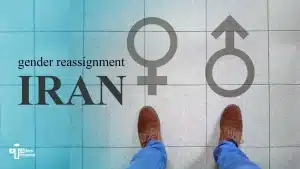Are you considering gastric sleeve weight loss surgery because despite trying exercise and diets for many years, you have a lot of weight to lose? You are interested to know the pros and cons, the risks and benefits, what makes you a good candidate for gastric sleeve weight loss surgery in Iran, and what long-term instructions you need to make to keep the results.
In this operation, surgeons remove a part of your stomach and join the remaining parts together to make a new banana-shaped stomach that is named “sleeve.” After this surgery, with just a small bag (about 1/10th of your original stomach size), you’ll feel full faster than you did before. You will not be able to eat as much as you did before, which helps you to lose your weight. On the other hand, sleeve weight loss surgery removes the part of your stomach that makes a hormone that raises your appetite.
- Bariatric weight loss surgery or gastric bypass surgery in Iran
- Different weight loss surgeries in Iran
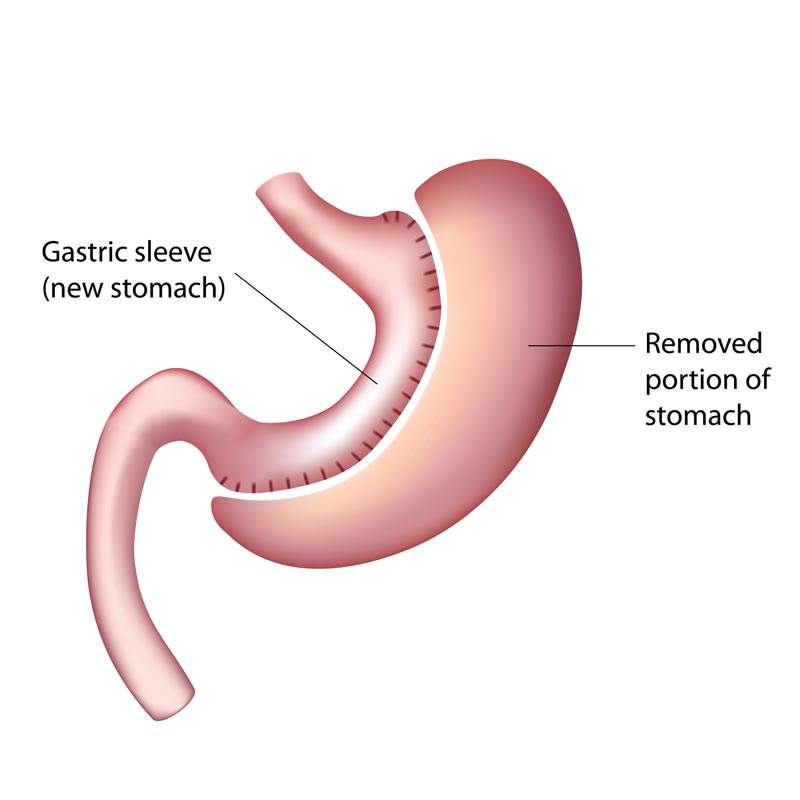
Is Gastric sleeve weight loss surgery different from Gastric Bypass surgery or Bariatric weight loss surgery?
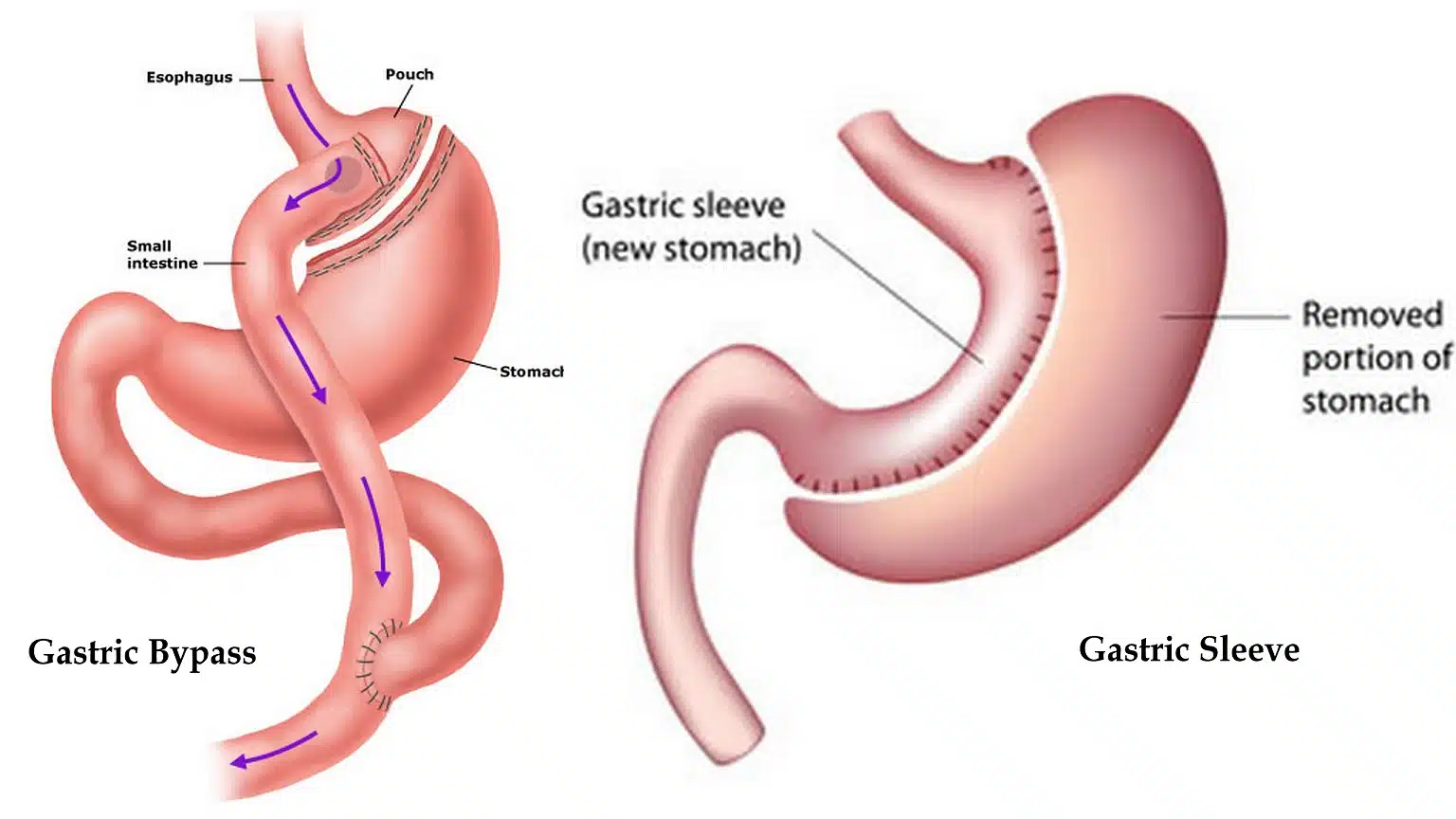
Good candidate for gastric sleeve surgery

Some important Tips for gastric sleeve surgery
We advise you to consider these important tips and use them to your benefit. If you had some problems after the gastric sleeve surgery, go to the hospital or clinic that operated you or consult with your agency. You must go and see a doctor if you have problems, do not postpone it because it might be very dangerous.
Gastric Sleeve weight loss surgery in Iran
Tebmedtourism company is a leading facilitator of weight loss surgeries in Iran. At Tebmedtourism company, weight loss procedures are provided by highly qualified and experienced surgeons who have undergone intensive specialist training in their specialty. Tebmedtourism healthcare facilitator team offers sleeve gastrectomy as a good weight loss surgery option.
Sleeve weight loss cost in Iran compared with Sleeve cost in other countries?
Nowadays, medicine is a globalized and most issues like Sleeve weight loss can be treated in different parts of the world. However, every year many people go to Iran to receive Sleeve weight loss treatment there. Some important reasons for most patients are the high quality of the therapy and the significant role of costs compared to other countries. Generally, Sleeve weight loss cost in Iran is one fifth of Sleeve weight loss cost in other countries while the quality is compatible with countries such as the USA and Germany.
- You can find the average cost of Sleeve weight loss in Pakistan 70% higher than the cost of Sleeve weight loss in Iran.
- You can find the average cost of Sleeve weight loss in Turkey 215% higher than the cost of Sleeve weight loss in Iran.
- You can find the average cost of Sleeve weight loss in Czech 130% higher than the cost of Sleeve weight loss in Iran.
- You can find the average cost of Sleeve weight loss in Thailand 180% higher than the cost of Sleeve weight loss in Iran.
- You can find the average cost of Sleeve weight loss in Malaysia 190% higher than the cost of Sleeve weight loss in Iran.
- You can find the average cost of Sleeve weight loss in India 175% higher than the cost of Sleeve weight loss in Iran.
- You can find the average cost of Sleeve weight loss in Mexico 110% higher than the cost of Sleeve weight loss in Iran.
- You can find the average cost of Sleeve weight loss in Poland 150% higher than the cost of Sleeve weight loss in Iran.
- You can find the average cost of Sleeve weight loss in Hungary 195% higher than the cost of Sleeve weight loss in Iran.
- You can find the average cost of Sleeve weight loss in Australia 520% higher than the cost of Sleeve weight loss in Iran.
- You can find the average cost of Sleeve weight loss in UK 520% higher than the cost of Sleeve weight loss in Iran.
- You can find the average cost of Sleeve weight loss in Germany 320% higher than the cost of Sleeve weight loss in Iran.
- You can find the average cost of Sleeve weight loss in UAE 240% higher than the cost of Sleeve weight loss in Iran.
- You can find the average cost of Sleeve weight loss in Canada 590% higher than the cost of Sleeve weight loss in Iran.
- You can find the average cost of Sleeve weight loss in Costa Rica 370% higher than the cost of Sleeve weight loss in Iran.
- You can find the average cost of Sleeve weight loss in USA 790% higher than the cost of Sleeve weight loss in Iran.
- You can find the average cost of Sleeve weight loss in New Zealand 810% higher than the cost of Sleeve weight loss in Iran.

The benefits of the gastric sleeve weight loss surgery
A gastric sleeve weight loss surgery will dramatically reduce your calorie intake. You can eat normally but you need much smaller portions during a meal. It can lead to great weight loss in a short period of 1 to 2 months. By weighing less after the surgery, patients should also find it much easier to move around and carry out normal daily activities. Regarding the fact that this operation method preserves the duodenal pylorus (the valve that regulates emptying of the stomach), it allows food to stay in the stomach for a while, result in to make you feel full while the food trickles out. There is no rearrangement of the intestine in a sleeve surgery, so dumping syndrome, which may occur after gastric bypass surgery or Bariatric weight loss surgery, is not a complication of this operation. Also, gastric sleeve weight loss surgery does not affect the absorption of food, so nutritional deficiencies are less likely to occur unlike gastric bypass surgery or Bariatric weight loss surgery. The part of your stomach that contains cells to produce an appetite stimulating hormone, called ghrelin, will be removed during this surgery, so your hunger will be reduced more after this surgical method compared with other weight loss procedures such as gastric banding.
What Happens during gastric sleeve surgery?
After general anesthesia, your surgeon will make a few small cuts in your belly and insert a laparoscope device (which is an instrument with a tiny camera that sends pictures to a monitor). The operation takes about 2 to 3 hours. The surgeon will then insert other medical instruments through the cuts and remove 3/4 of your stomach. Finally, he’ll reattach the rest of your stomach to form the “sleeve” or a banana-shaped tube. You might stay in the hospital about 2 or 3 days. The result of this operation is permanent.

Other points to keep in mind after your operation:
- Everything should be chewed completely before swallowing.
- Don’t drink while eating, as this habit might cause your new stomach to get overfill.
- Drink liquids 20 to 30 minutes after finishing a meal.
- Avoid high-calorie drinks and foods.
- Take administered vitamin and mineral supplements every day.
After 2 or 3 months, you can move on to regular meals. But keep in mind, you will not be able to eat as much as you used to.
New Eating Habits after gastric sleeve weight loss surgery
The first day after sleeve gastrectomy, you should drink just clear liquids. By the time you leave the hospital, you can eat pureed foods and protein shakes and continue to do so for about 2 to 4 weeks. Keep in mind that you should change your past eating habits forever. After that first month, you’ll switch to eating soft solid foods very slowly.
How much weight do you lose after gastric sleeve weight loss surgery?
People generally lose 50-70% of their excess weight over 12 to 18 months. In other words, sleeve gastrectomy results in 25-30% of your total body weight loss. Of course, exercising and eating right add to your weight loss.
Endoscopic sleeve plication
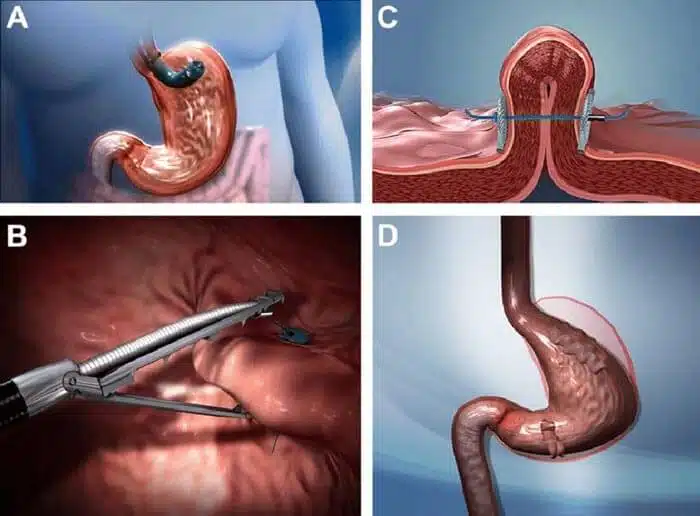
Sleeve gastroplasty is performed to assist you with getting more fit and possibly bring down your danger of genuine weight-related medical issues, including:
- Coronary illness and stroke
- Hypertension
- Nonalcoholic greasy liver ailment (NAFLD) or nonalcoholic steatohepatitis (NASH)
- Rest apnea
- Type 2 diabetes
- Osteoarthritis (joint torment)
Sleeve gastroplasty and other weight reduction strategies or medical procedures are ordinarily done simply after you’ve attempted to get more fit by improving your eating routine and exercise propensities.
Risks of Endoscopic sleeve gastroplasty
Up until this point, endoscopic sleeve gastroplasty has indicated an ideal security profile. Agony and sickness may happen for a few days after gastric sleeve surgery. These symptoms are typically dealt with torment and queasiness prescriptions. Many people feel better following a couple of days. What’s more, despite the fact that it’s not intended to be a transitory methodology, sleeve gastroplasty can be changed over to other bariatric medical procedures. At the point when joined with a way of life alteration, sleeve gastroplasty results in about 15% to 20% all out body weight reduction at one to two years.
The effect of sleeve surgery on diabetes
Is it possible to control diabetes by sleeve weight loss surgery?
Yes! Sleeve weight loss surgery improves type 2 diabetes in obese people indirectly. That is, diabetes is not treated with gastric sleeve surgery. Instead, the weight loss and slimming caused by this surgery regulates blood sugar and improves diabetes in a person. For people with diabetes who have a BMI or body mass index above 30 or 35 and the drug has not been able to regulate their blood sugar, sleeve weight loss surgery is prescribed as a solution to this problem.

How is diabetes treated with sleeve weight loss surgery?
During sleeve weight loss surgery, 75% of the stomach is removed and only a small volume remains in the form of a tube. As the stomach shrinks, the amount of food consumed decreases and the patient begins to lose weight. Weight loss will be followed by fatigue and constant tiredness. These hormones secrete insulin, which ultimately improves the patient’s type II diabetes.
A few things to keep in mind:
The effect of gastric sleeve surgery on the treatment of type 2 diabetes is great, but you should keep in mind that: This effect will depend on your medical history and previous control over your diabetes. Modify your diet slightly. Have ongoing activities. After surgery, your general health, including the endocrine glands, should be checked regularly by your doctor.
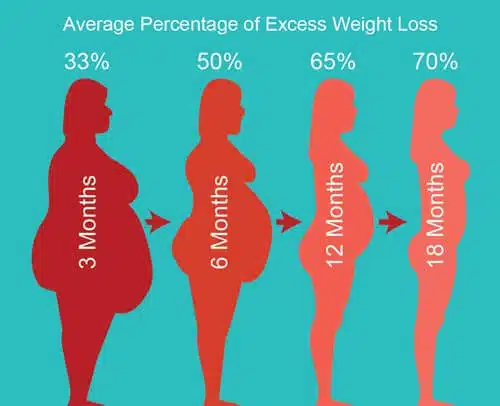
The effects of sleeve surgery in obesity and hypertension

How sleeve weight loss surgery is related to obesity and hypertension?
There are many treatments for obesity and related diseases, but the most effective, safest and best way is to lose weight, so the best solution is sleeve weight loss surgery. Gastric sleeve surgery is a procedure that reduces permanent fat accumulations and treats obesity.
Can weight loss surgery really cure hypertension?
Sleeve weight loss surgery is a great way to lose weight and control your health. In fact, several studies have concluded that bariatric surgery or gastric sleeve surgery for obesity treatment can have long-term positive effects on hypertension. For example, a 2004 study found that more than 75 percent of people with hypertension had a significant reduction or decrease in their blood pressure after weight loss surgery. Another study in 2006 concluded that sleeve weight loss surgery has a significant effect on the treatment of hypertension. In fact, more than half of the hypertensive patients who underwent bariatric surgery no longer needed blood pressure medication after the operation.
Sleeve weight loss surgery
In sleeve weight loss surgery, about 75% of the stomach volume is removed. The only part that left is something like a banana. Despite such a small stomach, a person eats little, gets full quickly, and eventually, over time, both his obesity and hypertension go away.
The main advantage of sleeve weight loss surgery is the reduction of hunger.
In gastric sleeve surgery, the left side of the stomach is cut, that is where the hormone “Ghrelin” is produced and secreted, and the hormone ghrelin sends a signal of hunger to the brain. So the person will feel less hungry and will be full longer. Hypertension is often controlled or completely cured after weight loss surgery. Dietary changes, along with weight loss after surgery, usually mean that you do not need blood pressure medication to control the condition. Sleeve weight loss surgery is the best way to get rid of obesity and hypertension and it helps to be healthy and enjoy your life.
Sleeve weight loss surgery diet
Pre- sleeve surgery
Fundamentally your obesity is affecting your liver. In case you’re fat, your liver doubtlessly has an aggregation of fat cells both in and around it. This makes it bigger than it must be. Your liver is right close to your stomach. A too-huge liver makes sleeve weight loss surgery harder for your primary care physician to do, and more perilous for you to have done.
Week 1 eating regimen
For the 1st week after gastric sleeve surgery, you’ll proceed with a similar clear fluid diet you followed in the days before your medical procedure. This will assist with staying away from postoperative confusions, including gastrointestinal obstructions, gastric perforation, diarrhea, clogging, and dehydration. Your body needs an ideal opportunity to recuperate, and this diet will help with this goal.
Tips to remember include:
- Drink a lot of clear fluids. In this procedure that you experience, staying hydrated is really important so consult with your surgeon on electrolyte fluids usage, for example, low-calorie Gatorade.
- Try not to drink anything with sugar. Sugar can cause dumping condition. Liquids with excess sugar enter the small intestine rapidly. The outcome is vomiting, fatigue, diarrhea, and regurgitating.
- Caffeine may add to heartburn and gastro esophageal reflux, and should likewise be avoided.
- Carbonated drinks combined with sugar or seltzer water will increase abdominal distention and swelling. These should all be evaded postoperatively and potentially even long term.
Week 2 eating regimen
During the second week after sleeve gastrectomy, you can change to a full-fluid eating regimen.
- Sugar-free shakes, for example, Guarantee Light
- Breakfast drinks
- Shakes made with protein powder

Week 3 eating regimen
During week three, you can include delicate, pureed nourishments to your eating regimen. Eat gradually and chew food completely. Any low-fat, without sugar food that you can puree, including lean protein sources and non-fibrous vegetables, are worthy.
Week 4 eating regimen
Presently that you’re one month post-medical procedure, you can begin adding strong nourishments to your eating routine.
How long is my hospital stay for gastric sleeve?
After gastric sleeve or Sleeve gastrectomy , you need to stay at hospital for 2 to 3 days.
How long shall I stay in Iran for gastric sleeve weight loss surgery or sleeve gastrectomy?
You should stay in Iran for 10 to 14 days to complete your recovery time and safe air travel.
How long does it take to recover from gastric sleeve or Sleeve gastrectomy in Iran?
In 10 to 14 days after sleeve gastrectomy, you can return to your country. Your total recovery time takes 3 to 6 weeks.
How long after Sleeve gastrectomy surgery can I return to physical activities and exercising?
You should avoid exercising and physical activities for two to three weeks after sleeve weight loss surgery. The initial step of your activities is to increase range of your motion so you can as an example, pick things up off the ground. Heavy activities and exercises after Sleeve gastrectomy surgery are also important because as you lose weight you will lose muscle, but you should wait 4-6 weeks.
How long after gastric sleeve or sleeve gastrectomy can I return to work?
As medical guideline says, gastric sleeve surgery or sleeve gastrectomy has 2 to 3 weeks recovery time. So you can return to work after this period of time.
How do I exercise after gastric sleeve surgery?
You should start with light physical activities and increase the range of your motion in 3 to 6 weeks to heavier activities after your sleeve weight loss surgery.
Is gastric sleeve painful? Is there a lot of pain after gastric sleeve surgery?
Your gastric sleeve will be done under general anesthesia so you will not experience any pain during your operation. After gastric sleeve surgery, the surgeon will prescribe anti-pain medicines to reduce or eliminate your pain after sleeve weight loss surgery.
When will I start losing weight after gastric sleeve?
Your expected weight loss after sleeve weight loss surgery typically starts to occur immediately after your operation. In few cases, no weight loss occurs in first 3 weeks after sleeve gastrectomy. The amount of weight loss after sleeve weight loss surgery would be rapid in the first 3 to 6 months after sleeve surgery.
How much weight will I lose after gastric sleeve surgery?
The amount of your weight loss after gastric sleeve surgery differs person to person. Another important factor that may influence your weight loss after sleeve surgery is the operation technique that your surgeon uses (laparoscopic gastric sleeve surgery, open sleeve weight loss surgery or Bariatric surgery). On average, you can expect 25% to 30% body weight loss or 60% to 80% of your excess weight loss in 6 to 12 months after gastric sleeve surgery.
What is my diet after gastric sleeve surgery?
What can I eat after gastric sleeve surgery? After sleeve weight loss surgery, you should start with liquids and pureed foods slow. In 2nd to 3rd week after sleeve surgery, you can eat soft foods like eggs, soups and continue with normal diet. Please follow your post-operative instructions for diet regimen.
Can I get pregnant after gastric sleeve surgery?
We advise to wait at least 12 to 18 months after Sleeve gastrectomy to complete your healing period for a safe and healthy pregnancy.
Shall I do some tests before gastric sleeve surgery?
You should perform routine laboratory tests, gastric endoscopy and ultrasound evaluations before you go through gastric sleeve surgery.
Is sleeve weight loss surgery safe for diabetics?
Weight loss surgery such as gastric sleeve in patients with diabetes mellitus type 2 is a great solution to improve their diabetes condition. Diabetics will experience great reduction in average blood sugar levels after sleeve weight loss surgery.
How long after gastric sleeve can I walk?
You can start to walk in 2 weeks after your sleeve gastrectomy. Start by walking for just 10 minutes and increase gradually day by day.
How long should I stay at home after Sleeve gastrectomy surgery?
We recommend staying at home for 7 to 10 days after gastric sleeve surgery.
What are the complications associated with the sleeve weight loss surgery?
There are some complications and side effects after sleeve weight loss surgery as well as other surgeries including blood clots, gallstones, operation site herniation, bleeding, leakage, stomach or intestine perforation, etc. If you plan your sleeve weight loss surgery by skilled surgeon, you will not experience any side effects and complications.
What is the success rate of sleeve weight loss surgery?
General success rate of sleeve weight loss surgery is 95-98% in one year.
Will I have loose and saggy skin after gastric sleeve?
Depending on the amount of your weight loss, you may experience loose and saggy skin in your belly and thighs. To avoid or treat this unwanted side effect, you should plan a regular exercise while you lose your weight. On the other hand, you could perform abdomaniplasty or Tummy Tuck to tighten your abdomen or belly skin after gastric sleeve surgery.
What is the mortality rate for gastric sleeve surgery?
Gastric sleeve surgery is considered as a safe weight loss procedure when compared to other weight loss surgeries such as Baritric surgery or others. Severe complications are rare after gastric sleeve surgery. Mortality rate of sleeve weight loss surgery may vary from 0.1% to 0.15%.
Is it necessary to use food supplements after gastric sleeve surgery? Does taking food supplement increase my appetite?
Patients who undergo sleeve weight loss surgery are advised to use food supplements such as multivitamins, minerals, calcium, vitamin D, vitamin B12, vitamin C, etc. Food supplements will not increase your appetite and just substitute your needed supplements to support your health.
When can I fly after gastric sleeve surgery?
It is recommended to postpone your flying for 7 days after gastric sleeve for short flights and 10 to 14 days after gastric sleeve for long flights.
Can sleeve weight loss surgery cause cancer?
All medical documents show a meaningful reduction in risk of cancers after sleeve weight loss surgery as well as Bariatric surgery.
When can I start to drink alcohol after gastric sleeve surgery?
You should avoid drinking alcohol after Sleeve gastrectomy surgery for the first 6 months. Drinking alcohol may cause intoxication and low blood sugar.
Should I Consider Having Weight Loss Surgery?
Weight loss surgery is not for everyone. Doctors generally recommend it only for people who:
- Have a body mass index (BMI) of 40 or more — about 100 pounds overweight for men and 80 for women
- Have a lower BMI (35 to 40), but also have serious health problems related to obesity such as heart disease,diabetes type 2,high cholestrol, or severe sleep apnea.
- Have tried and failed to lose weight by nonsurgical means such as diet and exercise.
Fully understand the risks associated with weight loss surgery and are motivated.
How Will My Physical Appearance Change After Weight Loss Surgery?
As you start losing weight, you will likely be thrilled with your new appearance. However, many people who lose a lot of weight often find their skin looks loose and baggy. You may want plastic surgery to remove this excess skin.
Will My Social Life and Relationships Change After Weight Loss methods?
Your relationships with friends and family may indeed change after weight loss surgery. For many people, food and drink are the basis for socializing. After weight loss surgery, you must find other ways to socialize — ways that aren’t focused on food. Also, as you lose weight, the results will be obvious. People will notice, and ask you about your appearance. Prepare for these questions ahead of time — and consider how you want to answer them.
Will I Feel Like Myself After I Lose Weight?
Losing a significant amount of weight is no small matter. In fact, the effects are profound and far-reaching. Life may seem disconcerting at times. You may feel odd, not quite like yourself. You may feel overwhelmed by the lifestyle changes you must make for the rest of your life. You may have reached for food as comfort — and have difficulty giving it up. A therapist can help you get through this complicated period. A support group can also help. Ask your doctor about support groups for people who have had weight loss surgery. It helps to meet people who are making the same adjustments you’re making — and can help keep you on track with your weight loss program.
How Much Weight Will I Lose After Surgery?
After gastric bypass surgery, most people can expect to lose between 66% and 80% of their extra body weight. Most of this is lost within the first two years. After gastric banding, people lose 40% to 50% of their extra weight, typically within the first two years after the surgery.
What Lifestyle Changes Are Necessary After Weight Loss procedures?
Over time, some people regain weight despite bariatric surgery. Some eat high-calorie or high-fat foods instead of healthy foods — and eat them too often. Some people rely on “soft meals” such as ice cream and milk shakes. The body itself may change over time, too, leading to weight gain. The digestive tract might begin absorbing more calories. Even the size of your surgical stomach can expand gradually over time. To keep the weight off, you need to work at it. Here are some tips:
- Eat very small meals.Adapting to small meals is challenging but necessary. Eat small amounts of food slowly, chew well, and eat lots of protein.
- Make nutrition a priority.You must make the foods you eat count. Good nutrition is critically important. You must also take the right supplements, as recommended by your health care provider, because serious malnutrition occurs easily following weight loss surgery. A dietitian can create a diet and nutrition plan designed to meet your needs.
- Exercise regularly. Many obese people aren’t used to exercise, but it’s very important to prevent weight regain. The good news: Once you start losing weight, exercise will get easier.








